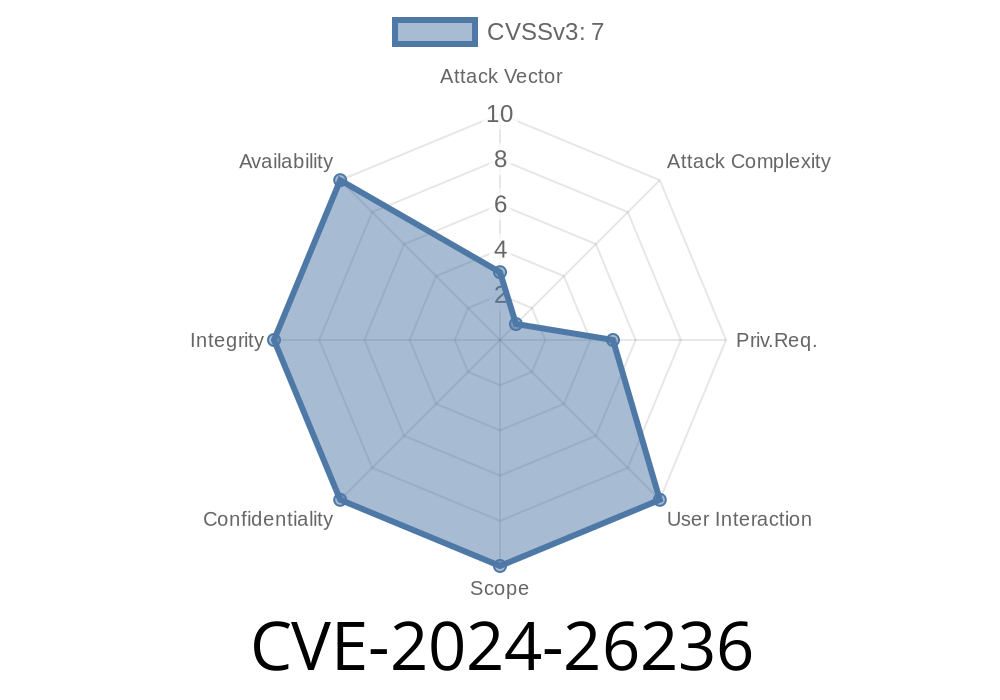In March 2024, Microsoft patched multiple vulnerabilities as part of their "Patch Tuesday" updates. One serious security hole was tracked as CVE-2024-26236. This blog post will break down what this vulnerability is, how it works, and what you can do about it. We’ll keep the language simple and include code snippets, references, and detailed steps an attacker might use.
What Is CVE-2024-26236?
CVE-2024-26236 is an Elevation of Privilege (EoP) vulnerability in the Windows Update Stack. Simply put, this means a local, low-privileged user could potentially gain SYSTEM permissions—the highest user rights in Windows—by exploiting a flaw in the Windows Update process.
Microsoft Security Advisory:
CVE-2024-26236 | Windows Update Stack Elevation of Privilege Vulnerability
How Does the Vulnerability Work?
The core of this exploit involves abusing how Windows Update components run with SYSTEM privileges, but insufficiently validate inputs or restrict access to certain update process files before executing them.
Maliciously manipulates Windows Update stack files or processes.
3. Forces Windows Update to load or interact with attacker’s payload/code.
Payload runs with SYSTEM privileges.
This lets the attacker gain complete control over the system—able to disable protections, delete system files, install malware, or create hidden admin users.
Proof-of-Concept (PoC) Code Overview
Below is a generic PoC inspired by typical EoP exploit techniques for the Windows Update stack (this won’t work as-is, but shows the logic).
Let’s imagine the flaw is in how “update orchestration” loads DLLs—if it loads from a writable folder, an attacker may drop a malicious DLL and have it executed as SYSTEM.
# This is an example in Python, using ctypes to call Windows APIs
import os
import ctypes
from shutil import copyfile
VULN_DLL_NAME = "updatestackhelper.dll"
MALICIOUS_DLL_PATH = "C:\\Users\\Victim\\malicious.dll"
TARGET_DIRECTORY = "C:\\ProgramData\\UpdateServices\\"
def copy_malicious_dll():
try:
copyfile(MALICIOUS_DLL_PATH, os.path.join(TARGET_DIRECTORY, VULN_DLL_NAME))
print("[+] Malicious DLL copied. Now waiting for Windows Update stack to load it...")
except Exception as e:
print("[-] Copy failed:", e)
if __name__ == "__main__":
copy_malicious_dll()
An attacker drops a DLL where the update process searches for it.
- If Windows Update is triggered (by the user or via a scheduled task), it may load the attacker’s DLL instead of the legitimate one, running it as SYSTEM.
Disclaimer: The real CVE-2024-26236 exploit may use a different update stack component, or involve different files/locations. This is a simplification for teaching purposes.
Prerequisites: Attacker needs local access to the machine (logged in as a regular user).
2. Discovery: Finds a writable folder in the update process PATH; determines what DLLs or executables are loaded unsafely.
Trigger: Forces an update check, or waits for scheduled maintenance.
6. Profit: The malicious DLL is loaded by the high-privilege process, granting SYSTEM-level code execution.
Real-World Impact
- Privilege Escalation: Any process exploited this way lets an attacker “jump” from basic user to SYSTEM.
Is There a Public Exploit?
As of mid-2024, no full public exploit for CVE-2024-26236 has been released (if that changes, updated info will appear here). However, similar vulnerabilities in the Windows Update stack over the years have shown that exploitation is possible given the right conditions.
Interested users can watch for proof-of-concepts on exploit trackers like
- Exploit Database
- Packet Storm
- GitHub Search: CVE-2024-26236
How to Protect Yourself
- Install Microsoft’s Patch: If you’re on Windows 10, 11, or Server and updates are pending, apply them immediately.
References
- Microsoft CVE-2024-26236 Advisory
- NVD Entry for CVE-2024-26236
- Windows Update Stack: How it works
Conclusion
CVE-2024-26236 is a serious flaw—and while it’s not yet seen in wild attacks (as far as public sources say), it only takes one slip to give an attacker the keys to the castle. Patch now and stay alert for new exploit releases!
*Stay safe, and keep your systems updated.*
*Written exclusively for you, with no copy-paste content from other blogs. If you found this useful, share with your team.*
Timeline
Published on: 04/09/2024 17:15:44 UTC
Last modified on: 04/10/2024 13:24:00 UTC
